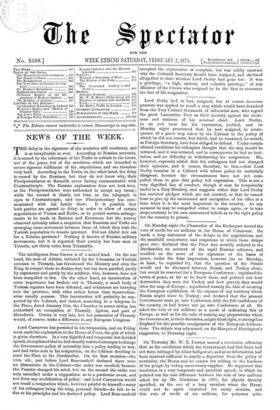Lord Carnarvon has persisted in his resignation, and on Friday
week made his explanation to the House of Peers, the pith of which is given elsewhere. In a very dignified and temperate but decided speech, he explained that he had steadily resisted attempts to change the Government policy of neutrality into a policy leading to war, and had twice sent in his resignation, on the Cabinet deciding to send the Fleet to the Dardanelles. On the first occasion—the 15th ult., just before Lord Beaconsfield declared there were no dissensions in the Cabinet—the order was recalled, because the Premier changed his mind, but on the second the order was only cancelled under a supposition as to a particular event, and not from any modification of policy ; and Lord Carnarvon would not recall a resignation which, however painful to himself—many of his colleagues being life-long, personal friends—he felt to be due to his principles and his declared policy. Lord Beac onsfield accepted the explanation as complete, but was coldly unaware why the Colonial Secretary should have resigned, and declined altogether to state whether Lord Derby had gone too. It was a privilege, "a high, ancient, and valuable privilege," of any Minister of the Crown who resigned to be the first to announce the fact of his resignation.


































